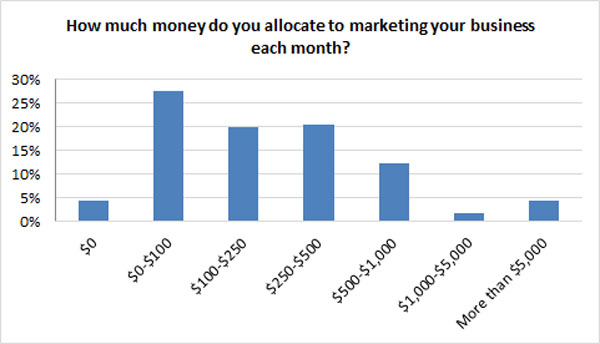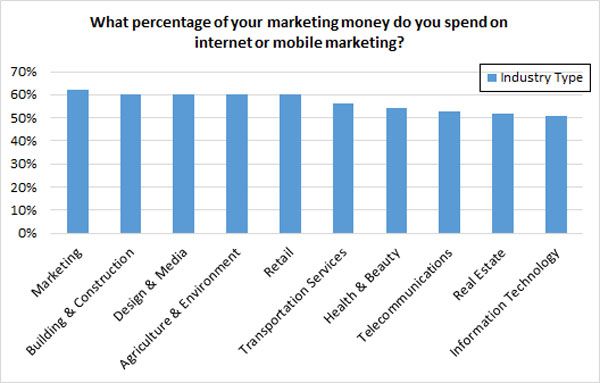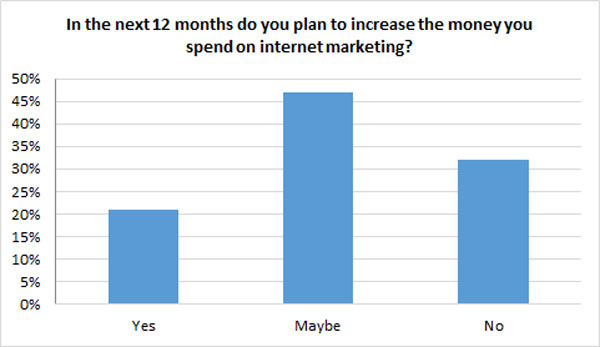SMBs Spend An Average 46% Of Marketing Budget On ‘Digital’
BrightLocal teamed up with ChamberOfCommerce.com to conduct an insightful piece of research into the attitudes toward and usage of Digital Marketing by SMBs (small and medium-sized businesses). (In the survey, we used the phrase “Internet or Mobile Marketing” to make it clear to survey respondents what we mean by Digital Marketing.) The objective […]
BrightLocal teamed up with ChamberOfCommerce.com to conduct an insightful piece of research into the attitudes toward and usage of Digital Marketing by SMBs (small and medium-sized businesses). (In the survey, we used the phrase “Internet or Mobile Marketing” to make it clear to survey respondents what we mean by Digital Marketing.)
The objective of the survey was to learn more about the level of knowledge, engagement and investment in digital by SMBs. We also wanted to understand their attitudes toward search consultants/agencies, to help determine how these 3rd parties can tailor their approaches/offerings to maximize their appeal to potential SMB clients.
2013 SMB Internet Marketing Survey
This online survey was conducted between 10th & 20th October 2013 and contained 10 questions covering a range of topics from marketing budgets and channel performance through to attitudes and usage of 3rd party consultants/agencies.
We contacted over 20,000 ChamberOfCommerce.com members and received 668 survey responses. We would like to thank all the businesses that participated in the survey; without their input, we wouldn’t have these valuable insights.
The following set of charts represent some of the key findings of this survey.
- Full survey results and charts can be viewed and downloaded on BrightLocal.
- Results for specific vertical industries from Legal & Financial to Builders & Construction to be published soon.
Survey Results
Fact: The average SMB spends $400/month on marketing.
Key Findings:
- The average spend on marketing by SMBs is $400/month.
- 32% of SMBs are spending less than $100/month on marketing their businesses.
- Just 6% spend more than $1,000/month.
Comments:
Many SMBs are conservative in their attitudes and willingness to spend on marketing. They spend sparingly and cautiously, and many don’t have a fixed or dedicated marketing budget.
This makes SMBs a tricky target market for media and marketing businesses to go after. Some Industry Sectors spend more heavily than others (see snapshot below), and smart agencies can tailor their services to these higher spending sectors.
SMBs Spend Avg. 46% Of Marketing Budget On ‘Digital’ Marketing
Key Findings:
- 24% of SMBs spend less than 10% of their marketing budget on digital marketing.
- 28% spend more than 70% of their marketing budget on digital marketing.
- On average, SMBs spend 46% of their marketing budget on digital marketing.
Comments:
Internet and mobile marketing lends itself more naturally to certain industries (e.g., Cafes, Hotels, Professional Services) than to others (e.g., Dry Cleaners, Petrol Stations).
Therefore, it’s not surprising to see a distributed set of results like this. Some business owners have truly embraced digital marketing, while others are grappling with various challenges presented by digital marketing (more on this below).
Word Of Mouth & SEO Are Most Effective Marketing Channels For SMBs
Key Findings:
- 27% say that Word of Mouth is most effective channel.
- 19% say SEO is a highly effective channel.
- Only 3% say that PPC is effective lead generator.
Comments:
Word of Mouth (WoM) has been, and will continue to be, the most effective method for an SMB to reach new customers. SEO is the second most effective channel, and it’s interesting to note the role that “reputation” and “authority” play in both channels.
- WoM: Reputation is created and destroyed by what your customers choose to share about your business.
- SEO: Your “authority” on a specific topic impacts your visibility in search engines; authority is a proxy for reputation, particularly in search engines, as 98% of searchers don’t look beyond the first 10 results before deciding which business to contact and use.
The two most surprising findings are the (perceived?) effectiveness of “Local Directories” (15%) and how far down the pecking order PPC comes in (at just 2%).
- Citysearch – 4.5m people/month (Nov ’12) – 2.2m (Oct ’13)
- Superpages – 6.4m – 3.9m (people/month)
- Yellowpages.com – 20.6m – 17m (people/month)
Directories with a high level of user engagement and a ton of fresh, unique review content (e.g., Yelp, TripAdvisor) remain strong — but do they really deliver better ROI than email marketing, PR and PPC?
In summary, it appears from the survey results that a combination of having a good local reputation (word of mouth), a solid foundation in SEO, and a presence in some quality online local directories would combine to be the most effective way of attracting new leads and customers for SMBs.
79% Of SMBs Have No Plans To Increase Spend On Internet Marketing
Key Findings:
- 21% of respondents said they DO plan to increase spending.
- 32% said they will NOT increase spending.
- 47% remain unsure of their plans for next 12 months.
Comments:
For advertising and marketing businesses that target SMBs, this won’t make for pleasant reading!
Only 21% of those surveyed plan to increase their spend on Internet marketing in the next 12 months, while 32% say they definitely won’t invest more.
Surely, as consumers spend more and more of their time online and connected via mobile devices, it seems logical that SMBs would shift their spending to channels that reach these audiences. But, these results don’t support that assumption.
In the previous chart, 3 of the top 5 most effective lead gen channels are “digital,” yet SMBs are not backing up that sentiment with the spending. This begs several questions:
- Are they satisfied with their current marketing mix?
- Do they attract enough customers already?
- Are the unconvinced about the ROI of “digital” marketing?
- Are they confused/frustrated/dissuaded by the huge variety of digital marketing options presented to them?
78% Of SMBs Think Mobile Marketing Is Important For Their Business
Key Findings:
- 78% of respondents said that mobile/mobile marketing is an important channel.
- 18% are already using mobile marketing.
- 10% don’t think mobile marketing is relevant to their business.

Comments:
On the whole, SMBs appear to be aware of the growing importance of mobile marketing. Only 18% currently use it, but a further 60% believe that it will be important to their business in the future.
Although not all of those surveyed have a mobile optimized website (just 59%), an overwhelming majority do recognize its importance. And, with an increasing number of searches made on mobile devices, it is encouraging to see that SMBs are aware of the impending surge in non-PC browser traffic.
32% Of SMBs Are Contacted By A New Search Agency Every Day
Key Findings:
- 32% of SMBs are contacted every day by a search agency.
- 75% of SMBs are contacted at least 1 time per week by a search agency.

Comments:
Competition is high in the search marketing industry, and it’s common knowledge that SMBs get bombarded with emails and calls from agencies/consultants. As many as 32% of SMBs are being contacted each day by an agency scouting for new business, so you can only assume that the success rate of unsolicited pitches is low.
What is useful for agencies/consultants to know is what traits appeal most to SMBs when they are selecting an agency to work with.
We know that SMBs are cost-conscious, so it was no surprise to learn that “low cost” was the most important trait, with 19% of respondents citing this.
On a much more positive note for agencies, SMBs also value a good reputation (13%) and industry knowledge (11%) when selecting a provider to work with. So, focusing on these within your pitches and presentations will lead to a more successful sales process.

53% Of SMBs Feel “Negatively” About Google Places/Google Local
Key Findings:
- 40% of SMBs say that Google Places/Local is clear and easy to use.
- 22% of SMBs know it is important but do not understand it.
- 9% of SMBs do not think Google understands small businesses.
- 7% of SMBs do not believe it is important.
- 14% of SMBs find it frustrating due to constant changes.

Comments:
Opinion is divided over Google Places/+Local among SMBs. Its value and importance as a marketing channel is not disputed, but SMBs don’t necessarily feel positive about it.
Many struggle to understand how it works and are frustrated by the regular reincarnations it goes through, which require them to learn a new set of rules and interfaces. Customer support has been improving, but from a very low base. It has a long way to go to meet the expectations of SMBs and SEOs alike.
That said, nearly 45% either “love it” or find it clear and easy to use. Had we run this survey 12 months ago, the results would probably have been more negative than they are now. Evidently, Google is moving in the right direction and winning supporters as it does so.
Having a stable, user friendly and well-supported Google Local product is a great thing for the industry — so carry on the good work, G!





